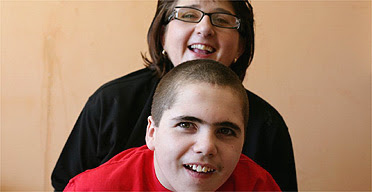Giving drugs to children with epilepsy is often ineffective and can have terrible side-effects. But there is an alternative - a high-fat food plan that dramatically reduces seizures The diet might have spared him 24,000 seizures' ... Emma Williams with her son Matthew. Photograph: Martin Godwin
The diet might have spared him 24,000 seizures' ... Emma Williams with her son Matthew. Photograph: Martin Godwin
Matthew was one of the few to be placed on a medical trial at GOSH studying the effects of the Ketogenic diet in the treatment of childhood epilepsy. It is similar to the Atkins diet, in that it is high fat, with some protein and very low carb. This puts the body into a fat-burning state called ketosis, during which it produces chemical compounds called ketones, which stop the seizures. The diet had been used to treat epilepsy for many years but, with the arrival of epileptic drugs, it was sidelined. Now, thanks to this randomised control trial by paediatric neurologist Professor Helen Cross, it is undergoing a resurgence.
Epilepsy is a common neurological disorder characterised by recurrent seizures when the normal working of the brain is interrupted. It affects around 200,000 children in the UK, a third of whom will be resistant to medication. "There is no doubt that this diet works in a significant amount of children," says Cross. "If you fail with the first two drugs then the likelihood of any other drug succeeding is about 10%. In those cases parents should be offered the diet before proceeding with other medications. Our trial, where all the children had not responded to medication, showed that 50% got more than 50% improvement in seizures, which shows a significant benefit over drugs."
Families such as Matthew's live with the daily trauma of seizures, drop attacks (when a child loses muscle tone and falls to the floor) and absences (where they appear conscious but are not aware of anything around them). Epilim, benzodiazepines and Keppra are all commonly prescribed for epilepsy but, in Matthew's case, they did little to stop the seizures. According to Emma, the "benzos", a tranquiliser, left him like a drooling zombie and the Keppra made him violent and highly disruptive. "I was desperate. We were running out of options. I knew I might lose him for good. I'd asked our neurologist, when Matthew was two, if we could try the diet but was told it was too difficult to implement and they had no resources.
"Matthew was eight by the time he got to try the diet. His first MRI brain scan at two showed he had no brain damage and they couldn't detect where the epilepsy was coming from. When he had his second MRI scan, before going on the diet, it showed that his brain was badly scarred from the seizures, which caused further seizures as well as brain damage. It's due to the brain damage that Matthew now can't walk. If he had got the diet in the first place, I worked out he might have been spared over 24,000 seizures."
Within two weeks of being on the diet Matthew's seizures had reduced by 90%, and his behaviour had completely calmed down. "For the first time ever, aged eight, he said 'Mama'," recalls Emma. "It was the most amazing feeling. I now have what's left of my boy back."
Emma is not the only parent to have met with resistance when asking for the diet. According to Cross, this is more likely due to lack of dietetic resources than lack of confidence in the diet. "There is knowledge among paediatric neurologists that it works. The problem is, we don't have enough resources and we need to have dedicated dieticians to implement it. I have the resources to have 30 children on the diet at any one time but I've still got a huge waiting list."
Paula and Ian Yates from Bedfordshire found they had a fight on their hands when they wanted to put their son Harry on the diet. He had been diagnosed with a rare form of epilepsy at the age of three. At first he had a seizure every couple of weeks, but once he started on the medications, he had seizures daily. "It was as if the drugs made him worse," says Paula. "Every time they upped his dose his seizures became more severe. Harry was losing his speech and the ability to walk. Within a few months he was having up to 50 drop attacks a day, he'd knocked seven of his teeth out falling down and had black eyes and a lacerated chin.
"I was told by Harry's neurologist that he would never walk or talk, and that I couldn't expect anything from his life. But I had been told by other parents that after using the diet their children got better. One father contacted me through a support network for parents of children with this type of epilepsy and told me that his son had gone seizure-free and drug-free from this diet."
Harry's condition continued to deteriorate. He had up to 100 seizures a day and was either completely floppy or twitching constantly. Paula went back to the consultant, asked again for the diet, and this time refused to take no for an answer. "Within three weeks of being on the diet Harry was happier and became more verbal. Once he was weaned off the drugs we saw an even bigger improvement. His seizures are reduced by 80% and, contrary to his prognosis, he can walk, talk and, better still, play in the playground with the other kids.



No comments:
Post a Comment